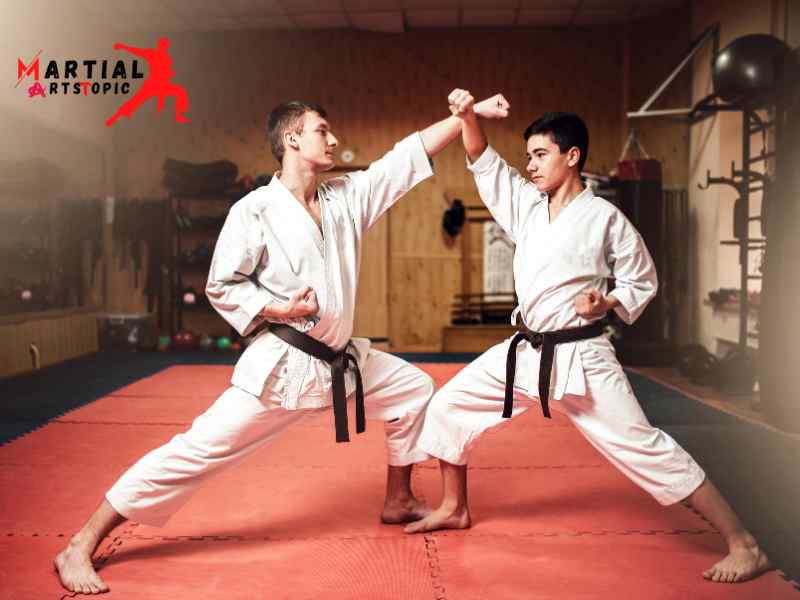
What is the Verbal Judo?: The Art of Self-Defense through Words
Verbal Judo: The Art of Self-Defense through Words Have you ever found yourself when you wished you had the power to diffuse a tense situation with just your words? Imagine being able to effectively communicate and protect yourself without resorting to physical force. That’s where the concept of Verbal Judo comes in.
Verbal Judo is the art of using words to redirect and control difficult situations. It is a powerful communication strategy that allows you to de-escalate conflicts, gain cooperation, and maintain self-control in challenging circumstances. By mastering the principles of Verbal Judo, you can effectively defend yourself using only your words.
In today’s fast-paced and often confrontational world, knowing how to navigate hard conversations is a valuable skill. Verbal Judo provides you with the tools to handle conflicts and disagreements with grace and confidence. Whether you’re dealing with a difficult co-worker, a disgruntled customer, or a tense family gathering, Verbal Judo can help you defuse the situation and achieve a positive outcome.
They rooted the principles of the Verbal Judo in respect, empathy, and effective communication. By showing respect for others and their opinions, you can create a more conducive environment for open dialogue. Empathy allows you to understand the underlying emotions and motivations of the other person, helping you to address their concerns more effectively. And through effective communication, you can convey your message clearly and assertively without escalating the conflict.
It can apply verbal judo techniques in various situations, from professional settings to personal relationships. In the workplace, using Verbal Judo can help you navigate office politics, resolve conflicts with colleagues, and improve team dynamics. In personal relationships, it can strengthen communication, defuse arguments, and build stronger connections.
The beauty of the Verbal Judo lies in its simplicity. It doesn’t require years of martial arts training or physical strength. Instead, it harnesses the power of words to influence and persuade. By mastering the art of Verbal Judo, you can become a more effective communicator, build stronger relationships, and navigate challenging situations with confidence.
So, how can you learn and practice Verbal Judo? There are various resources available, such as books, workshops, and online courses, that can provide you with the necessary knowledge and skills. Additionally, seeking guidance from experienced practitioners can help you refine your technique and gain valuable insights.
What is the Verbal Judo?

What is the Verbal Judo? The Art of Effective Communication Effective communication is a skill that can make or break relationships, both personal and professional. In today’s fast-paced world, it’s more important than ever to be able to express ourselves clearly and respectfully. That’s where Verbal Judo comes in.
Verbal Judo, also known as tactical communication, is a communication strategy that emphasizes empathy, understanding, and persuasion. It is a method of redirecting and diffusing conflict through the use of strategic language and non-verbal cues. By harnessing the power of words, Verbal Judo allows individuals to de-escalate tense situations, build rapport, and influence others positively.
Dr. George J. Thompson
Dr. George J. Thompson, a former English professor and police officer developed the concept of Verbal Judo. Drawing inspiration from martial arts, Dr. Thompson recognized the importance of verbal agility in diffusing potentially volatile encounters. He believed that by using the right words and techniques, individuals could effectively navigate tough conversations and achieve positive outcomes.
Verbal Judo is not about manipulation or winning arguments. Instead, it focuses on fostering cooperation, mutual respect, and understanding. By employing active listening, empathy, and open-ended questions, practitioners of Verbal Judo can create an environment conducive to effective communication and conflict resolution.
Verbal Judo is a mindset shift that encourages individuals to view communication as a tool for connection rather than a means of control. It teaches individuals to respond rather than react, to choose their words carefully, and to consider the impact of their communication on others.
The benefits of practicing Verbal Judo extend beyond personal relationships. In professional settings, Verbal Judo can be a valuable tool for leaders, managers, and customer service representatives. By using the principles of Verbal Judo, professionals can defuse tense situations, handle difficult customers, and build stronger, more productive relationships with colleagues and clients.
So, how can you start incorporating Verbal Judo into your daily life? Here are a few tips:
- Listen actively: When engaging in a conversation, make a conscious effort to listen actively. Focus on understanding the other person’s perspective before formulating your response.
- Practice empathy: Put yourself in the other person’s shoes and try to understand their emotions and motivations. By showing empathy, you can create a sense of connection and trust.
- Choose your words carefully: words have power. Use language that is respectful, non-confrontational, and neutral. Avoid inflammatory or judgmental language that can escalate conflicts.
- Ask open-ended questions: Encourage dialogue by asking open-ended questions that invite the other person to share their thoughts and feelings. This can help defuse tension and promote understanding.
- Stay calm and composed: In heated situations, it’s essential to remain calm and composed. Take deep breaths, maintain a confident posture, and speak in a calm and measured tone.
How Verbal Judo Can Improve Your Communication Skills
Verbal Judo: Unlocking the Power of Effective Communication In today’s fast-paced world, effective communication has become more important than ever. Whether it’s in our personal relationships, professional endeavors, or even our daily interactions, the ability to convey our thoughts and ideas clearly can make all the difference. That’s where Verbal Judo comes in.
Verbal Judo, also known as tactical communication, is a valuable technique that can enhance your communication skills and help you navigate challenging conversations with ease. By utilizing the principles of empathy, understanding, and active listening, Verbal Judo enables you to turn potentially confrontational situations into productive and positive interactions.
So, how can Verbal Judo improve your communication skills? Let’s delve into some of its key benefits.
- Enhances Conflict Resolution: Verbal Judo provides you with the tools to resolve conflicts peacefully and effectively. By choosing your words carefully and adopting a non-confrontational approach, you can de-escalate tense situations and find common ground with others. This skill is particularly valuable in professional settings, where conflicts can arise due to differences in opinions, priorities, or objectives.
- Fosters Empathy and Understanding: Verbal Judo emphasizes the importance of understanding and empathizing with others. By actively listening and acknowledging their perspectives, you can create a safe and inclusive space for open dialogue. This not only strengthens your relationships but also helps you build trust and rapport with others, leading to more meaningful connections.
- Improves Active Listening Skills: Active listening is a crucial component of effective communication. Verbal Judo teaches you how to focus, without interrupting or passing judgment. By giving your full attention to the speaker and using verbal cues such as paraphrasing and summarizing, you can ensure that you fully understand their message and respond appropriately.
- Boosts Confidence: One of the greatest benefits of Verbal Judo is the boost in confidence it provides. As you become more skilled in navigating tough conversations, you’ll feel more self-assured in expressing your thoughts and opinions. This newfound confidence will not only enhance your communication skills but also positively impact other areas of your life, such as public speaking or negotiation.
- Builds Stronger Relationships: Effective communication is the foundation of any successful relationship, be it personal or professional. Verbal Judo equips you with the tools to build stronger connections by fostering mutual respect, understanding, and cooperation. By consistently practicing these techniques, you’ll find that your relationships become more harmonious and fulfilling.
Benefits of Verbal Judo
Verbal Judo: Unlocking the Power of Effective Communication In a world where conflicts and disagreements are inevitable, mastering the art of communication becomes crucial. Whether it’s at home, in the workplace, or in everyday interactions, having the skills to effectively navigate tough conversations can make a world of difference. This is where the Verbal Judo comes into play.
Verbal Judo is a communication strategy that focuses on redirecting negative and confrontational interactions into positive ones. By employing specific techniques and approaches, individuals can diffuse tense situations, build rapport, and achieve better outcomes. In this blog post, we will explore the key benefits of Verbal Judo and how it can transform your personal and professional relationships.
- Conflict Resolution: Verbal Judo equips individuals with the tools to handle conflicts constructively. Instead of escalating a situation with aggressive or defensive responses, Verbal Judo encourages active listening, empathy, and the ability to respond calmly and respectfully. By understanding the perspectives of others and effectively communicating your own needs, conflicts can be resolved more effectively, leading to improved relationships and reduced stress.
- Enhances Emotional Intelligence: Verbal Judo places a strong emphasis on emotional intelligence – the ability to recognize, understand, and manage emotions, both in oneself and others. By honing these skills, individuals can navigate through challenging conversations with greater ease. Being aware of one’s emotions and responding appropriately to others’ emotions allows for more meaningful and productive communication.
- Builds Trust and Rapport: When individuals feel heard and understood, trust and rapport are built. Verbal Judo emphasizes the importance of active listening and using language that promotes collaboration rather than defensiveness. By demonstrating respect and empathy, you can establish a foundation of trust and strengthen relationships, whether it’s with colleagues, friends, or family members.
- Improves Leadership Skills: Effective leaders understand the power of communication. Verbal Judo provides leaders with the necessary tools to inspire and motivate their teams. By using persuasive language, active listening, and constructive feedback, leaders can create a positive and inclusive work environment. This leads to increased employee satisfaction, productivity, and overall success.
- Reduces Stress and conflict: Engaging in confrontational or negative interactions can be emotionally draining and counterproductive. Verbal Judo offers techniques to de-escalate tense situations, reducing stress and preventing conflicts from escalating. By remaining calm and composed, individuals can effectively navigate challenging conversations and maintain their own well-being.
- Enhances Personal and Professional Relationships: Effective communication is the cornerstone of healthy relationships. By adopting the principles of Verbal Judo, you can improve your relationships at home, in the workplace, and in all areas of your life. The ability to express yourself clearly, actively listen, and respond thoughtfully creates a positive and harmonious environment where conflicts are resolved and connections are strengthened.
Verbal Judo: Effective Techniques for Powerful Communication

In today’s fast-paced and interconnected world, effective communication is vital in both personal and professional relationships. Verbal Judo, a powerful communication technique, provides individuals with the skills to defuse conflicts, build rapport, and achieve positive outcomes. The techniques and strategies of Verbal Judo and how it can be practiced to enhance your communication skills.
Understanding the Essence of Verbal Judo
Verbal Judo, also known as tactical communication, focuses on using words and phrases to redirect and diffuse potentially volatile or confrontational situations. It empowers individuals to maintain control, build trust, and guide conversations towards constructive resolutions. By mastering the art of Verbal Judo, you can transform difficult conversations into opportunities for mutual understanding and positive outcomes.
Active Listening: The Foundation of Verbal Judo
A key aspect of Verbal Judo is active listening. Engaging in active listening allows you to fully understand the perspective of the other person, fostering empathy and creating a safe space for dialogue. By showing genuine interest and using open-ended questions, you can encourage the speaker to share their thoughts and feelings, providing valuable insights and establishing a foundation for effective communication.
Empathy and Emotional Intelligence
Empathy lies at the heart of the Verbal Judo. Put yourself in the other person’s shoes and strive to understand their emotions and motivations. By acknowledging their feelings and validating their experiences, you can establish trust and create a cooperative atmosphere. Developing emotional intelligence enables you to recognize and manage your own emotions, allowing for a more calm and composed response in challenging situations.
Choose Your Words Wisely
The choice of words can greatly affect the outcome of a conversation. Verbal Judo emphasizes using neutral and non-confrontational language to avoid escalating tensions. Instead of responding with defensiveness or aggression, choose words that demonstrate respect, understanding, and the willingness to find common ground. This approach helps to foster open and productive communication, even in the face of disagreement.
The Power of De-escalation
Verbal Judo teaches individuals how to de-escalate potentially volatile situations by redirecting negative energy and diffusing aggression. By acknowledging the other person’s concerns and expressing empathy, you can disarm hostility and create an opportunity for constructive dialogue. Techniques such as paraphrasing, summarizing, and reframing can be employed to redirect the conversation towards mutually acceptable solutions.
Maintaining Control and Building Rapport
Verbal Judo emphasizes the importance of maintaining control over your own emotions and reactions. By staying calm and composed, you can defuse potentially volatile situations and steer the conversation towards a positive outcome. Building rapport through active listening and empathy helps to establish trust and credibility, enabling more effective communication and conflict resolution.
The Power of Words: Harnessing Verbal Judo in Everyday Life
In a world where communication plays a pivotal role in our personal and professional lives, mastering the art of effective verbal communication is more important than ever. Verbal Judo, a concept rooted in the power of words, provides a valuable framework for navigating conversations and achieving positive outcomes. The concept of Verbal Judo and how it can be harnessed to enhance your everyday life.
Understanding Verbal Judo
Verbal Judo, originally developed by Dr. George J. Thompson, is a communication strategy that emphasizes using words and language to diffuse conflict, build rapport, and influence others positively. It is not about winning arguments or overpowering others, but about achieving understanding, cooperation, and constructive outcomes.
Harnessing the Power of Verbal Judo
- Building Rapport: Verbal Judo teaches us the importance of empathy and active listening. By genuinely understanding and acknowledging the perspective of others, we can establish rapport and create a positive environment for effective communication.
- Diffusing Conflict: Conflicts are an inevitable part of life, but with Verbal Judo, we can learn to de-escalate tense situations. By using respectful language, maintaining composure, and focusing on finding common ground, we can defuse conflicts and prevent them from escalating further.
- Persuasion and Influence:Verbal Judo recognizes that effective communication is not just about expressing oneself but also about persuading and influencing others. By choosing our words carefully, presenting logical arguments, and appealing to the emotions of others, we can increase our chances of getting our message across and achieving desired outcomes.
- Enhancing Relationships:Verbal Judo can significantly impact our relationships, both personal and professional. By practicing open and honest communication, demonstrating respect, and choosing our words thoughtfully, we can foster trust, strengthen connections, and create harmonious relationships.
- Self-Reflection and Personal Growth: Verbal Judo encourages self-reflection and personal growth. By analyzing our own communication patterns, being aware of our emotions, and constantly seeking improvement, we can enhance our verbal skills and become more effective communicators.
Applying Verbal Judo in Everyday Life:
Professional Settings
Whether it’s in the workplace or during business negotiations, Verbal Judo can help navigate challenging situations, resolve conflicts, and foster collaboration. By employing the principles of Verbal Judo – empathy, active listening, and respectful communication – we can create a positive work environment.
Personal Relationships
Verbal Judo can transform our personal relationships by promoting understanding, empathy, and effective communication. By practicing active listening, choosing our words carefully, and expressing ourselves respectfully, we can build stronger connections and resolve conflicts constructively.
Everyday Interactions
From casual conversations to disagreements with strangers, they can apply Verbal Judo in various everyday interactions. By focusing on empathy, choosing words that promote understanding, and maintaining a calm demeanor, we can diffuse tension and foster positive exchanges.
Verbal Judo: Essential Techniques for Diffusing Conflict
Verbal Judo: Essential Techniques for Diffusing Conflict In our fast-paced world, conflicts are bound to arise. Whether it’s in our personal relationships, at work, or even with strangers, knowing how to effectively handle conflicts is an essential skill. That’s where Verbal Judo comes in. Verbal Judo is a powerful communication strategy that can help you defuse conflicts and resolve issues peacefully. In this blog post, we will explore the essential techniques of Verbal Judo and how they can be applied in various situations.
The Techniques of Verbal Judo
- Empathy: The first technique of Verbal Judo is to show empathy towards the other person. By putting yourself in their shoes and acknowledging their feelings, you can create a more understanding and positive environment for communication.
- Active Listening: Active listening is a crucial skill in Verbal Judo. It involves fully focusing on the speaker, maintaining eye contact, and providing verbal and non-verbal cues to show that you are engaged in the conversation. By actively listening, you can better understand the other person’s perspective and respond appropriately.
- Respectful Communication: Respecting the other person’s dignity and maintaining a respectful tone is essential in Verbal Judo. Avoid using offensive or confrontational language, and instead, choose words that are neutral, polite, and non-threatening.
- Tactical Language: Verbal Judo emphasizes the use of tactical language to diffuse conflicts. This involves using phrases that redirect aggression, such as “I understand how you feel” or “Let’s find a solution together.” By using tactical language, you can shift the focus from confrontation to collaboration.
- Emotional Control: Maintaining emotional control is vital in Verbal Judo. It’s essential to stay calm, composed, and avoid getting caught up in the heat of the moment. By controlling your emotions, you can better manage the situation and prevent it from escalating further.
Applying Verbal Judo in Unique Situations
It can apply verbal Judo in various situations, from personal conflicts to professional disagreements. Whether you are dealing with an angry customer, resolving a dispute with a colleague, or diffusing a tense family argument, the principles of Verbal Judo can help you navigate these situations with finesse.
Why Verbal Judo is Essential for Successful Relationships
Verbal Judo: The Key to Building Successful Relationships In today’s fast-paced world, effective communication is more important than ever. Whether it’s in personal relationships, professional environments, or even casual interactions, the way we communicate can make or break our connections with others. That’s where Verbal Judo comes in. They have proven this powerful technique to be essential for fostering successful relationships, enabling individuals to navigate conflicts, diffuse tensions, and build stronger connections. In this blog post, we will explore why Verbal Judo is crucial for building successful relationships and how it can be applied in various aspects of our lives.
The Power of Verbal Judo in Relationships
In any relationship, conflicts are bound to arise. Whether it’s with our significant other, family members, friends, or colleagues, disagreements can strain relationships and create unnecessary tension. This is where Verbal Judo becomes an invaluable tool. By mastering the art of tactical communication, we can transform conflicts into opportunities for growth and deeper understanding.
Active Listening and Empathy: The Foundation of Verbal Judo

At the core of the Verbal Judo lies the skill of active listening. Many conflicts arise because of misunderstandings or a lack of effective communication. By actively listening, we can show a genuine interest in the other person’s perspective, validate their feelings, and create a safe space for open dialogue. Furthermore, empathy plays a crucial role in Verbal Judo. Putting ourselves in others’ shoes allows us to better understand their emotions, needs, and concerns. By demonstrating empathy, we foster understanding and build trust, essential elements for successful relationships.
Diffusing Tensions and Resolving Conflicts
Verbal Judo equips individuals with techniques to diffuse tensions and resolve conflicts peacefully. It emphasizes the importance of choosing our words carefully, using non-confrontational language, and maintaining a calm demeanor. By doing so, we can prevent conflicts from escalating and find mutually beneficial resolutions. Verbal Judo empowers individuals to be assertive without being aggressive, promoting healthy communication and preserving relationships.
Applying Verbal Judo in Everyday Interactions
It does not limit verbal judo to intense conflicts; it can also be applied to everyday interactions. By incorporating Verbal Judo techniques in our conversations, we can enhance our relationships, strengthen connections, and create a positive environment. Whether it’s expressing appreciation, providing constructive feedback, or simply engaging in small talk, Verbal Judo helps us communicate effectively and with respect.
In conclusion
What is the Verbal Judo? verbal judo is a powerful technique that can be utilized to effectively manage conflicts and communicate in challenging situations. By employing the principles of empathy, respect, and strategic communication, individuals can successfully navigate hard conversations and de-escalate tense encounters. Verbal judo teaches us that words have the power to either defuse or escalate a situation, and by choosing our words carefully, we can foster understanding, build rapport, and find common ground. Whether in personal or professional settings, the application of verbal judo can lead to improved relationships, enhanced conflict resolution skills, and ultimately, more positive outcomes.
